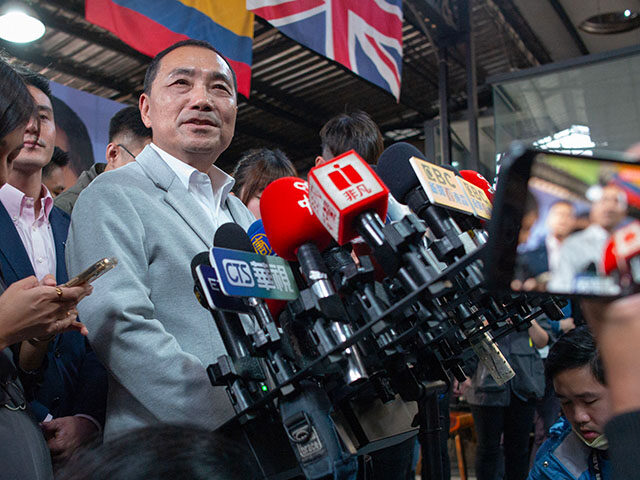Taiwan’s presidential race took a few interesting twists Saturday and Sunday, as an effort by the opposition Kuomintang (KMT) and Taiwan People’s Party (TPP) to create a fusion ticket collapsed, while front-running Democratic Progressive Party (DPP) candidate Lai Ching-te chose Taiwan’s envoy to the United States as his running mate.
The fusion ticket plan called for TPP leader Ko Wen-je to form a joint presidential ticket with KMT candidate Hou Yu-ih. As often happens with such joint ticket schemes, negotiations fell apart when both candidates insisted on running at the top of the ticket.
TPP and KMT agreed to settle that argument by looking at the last round of polling before announcing their fusion ticket over the weekend, but the polling was too close to persuade Ko to accept the vice-presidential spot, which was the arrangement the larger and older KMT party had in mind all along.
Ko kept joint ticket hopes alive all the way through Friday’s deadline for candidate registration, but on Saturday he scuttled the plan once and for all. In fact, he seemed a bit testy that KMT kept pressuring him to settle for the vice-presidential slot. On Saturday, he accused KMT of “coercion” for refusing to stick with the strict polling formula devised in advance to determine which candidate would appear at the top of the ticket.
“I merely promised to yield when the margin of error in the polls falls within 3 per cent, but now the KMT asks to calculate both the 3 per cent up and down, meaning altogether 6 per cent,” Ko said, referring to the margin of error in the six polls considered by TPP and KMT leadership last week.
Under the original understanding between the two parties, Ko was supposed to throw in the towel and accept the VP slot if Hou was in the lead by more than the margin of error in a majority of the final week’s polling. Ko and Hou are still running essentially neck-and-neck.
Ko then voiced his severe doubts that a ticket led by Hou, currently the mayor of New Taipei, could defeat DPP frontrunner Lai Ching-te. Hou won a commanding victory in his mayoral race last year, but political analysts believe he will not perform well outside of safe KMT territory, in part because he underperforms with young voters — a deficiency Ko’s support might help him overcome, as Ko and TPP are popular with young Taiwanese.
KMT chairman Eric Chu Li-luan denied Ko’s accusations of tinkering with the formula for determining the top of the fusion ticket. He lobbed the exact same allegation back at Ko, accusing the TPP head of deliberately misconstruing the polling formula.
“The two sides should quickly sit down to try to resolve this ‘small difference’ in order to team up and work hard to fight for a victory in the election,” Chu urged, but it was not to be.
Ko hinted on Sunday that some sort of TPP-KMT alliance could still be worked out. Crucially, even though he talked about “fighting to the end” in the presidential race, he did not announce a running mate, and his spokespeople refused to confirm the dream of a fusion ticket was dead.
Frontrunner Lai and the fourth major candidate in the race, Foxconn founder Terry Gou, have both chosen their running mates.
Independent candidate Gou named actress and singer Tammy Lai, who recently played a presidential candidate in a show called “Wave Makers” on Netflix, as his vice-presidential candidate in September. Gou has been trying to convince KMT and TPP to unite behind him as the only candidate who can beat Lai, but so far neither of the other parties has shown much interest in doing so.
On Monday, Lai chose Hsaio Bi-Khim, Taiwan’s envoy to the United States, as his running mate. The choice seemed like a gesture of defiance against China, which loathes Hsiao and has slapped her with punitive sanctions twice, denouncing her as a “diehard secessionist.”
Hsaio, 52, was born in Japan to a Taiwanese father and American mother. She was tapped by outgoing President Tsai Ing-wen to be Taiwan’s envoy to the U.S. in 2020, becoming the first woman to hold the position. Before that, she was a legislator who won an impressive election victory in Kuomintang territory. She likes to refer to herself as a “warrior for democracy” and a “cat warrior” — a nickname she chose to mock China’s heavy-handed “wolf warrior” hyper-nationalists.
“I believe Bi-khim is definitely the best person when it comes to Taiwan’s foreign work today and she is also a rare diplomatic talent,” Lai said when announcing Hsaio as his choice. He praised her for helping to improve relations with the United States during her tenure as envoy, a position she resigned from on Monday to join the DPP presidential ticket.
Lai urged Taiwanese voters to unite behind his candidacy to send Beijing, and the world, an unmistakable message about Taiwan’s destiny of freedom.
“The world wants to know if Taiwanese people choose to trust Taiwan and carry on with its democratic path or to rely on China and adopt a pro-China stand to once again confine itself to China,” he said.
Lai added that voters should prefer the stability offered by the DPP to an “experimental political system” — a jab at the effort by KMT and TPP to form a joint presidential ticket.
“The whole world hopes for maintenance of the cross-strait status quo, but the other side of the Taiwan Strait has continued to change it by sending warplanes and warships to disrupt the order and interfere in Taiwan’s elections,” Hsaio said when accepting her nomination.

COMMENTS
Please let us know if you're having issues with commenting.